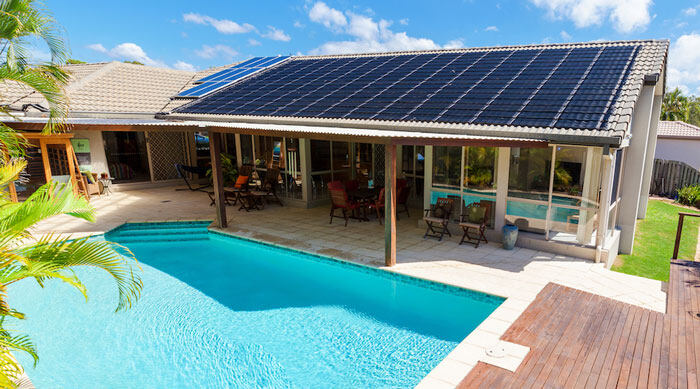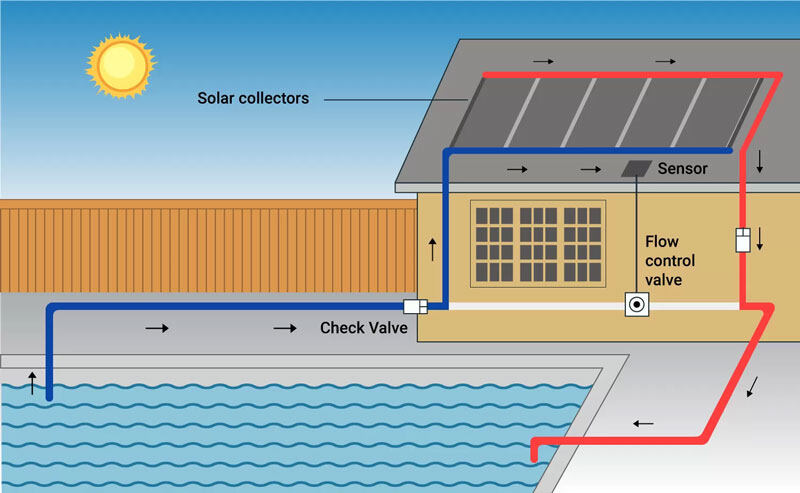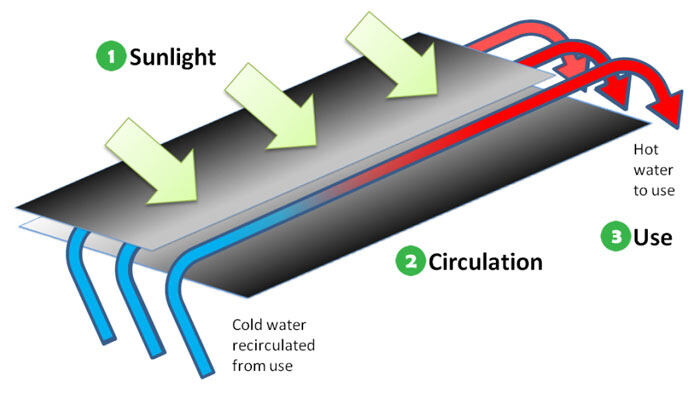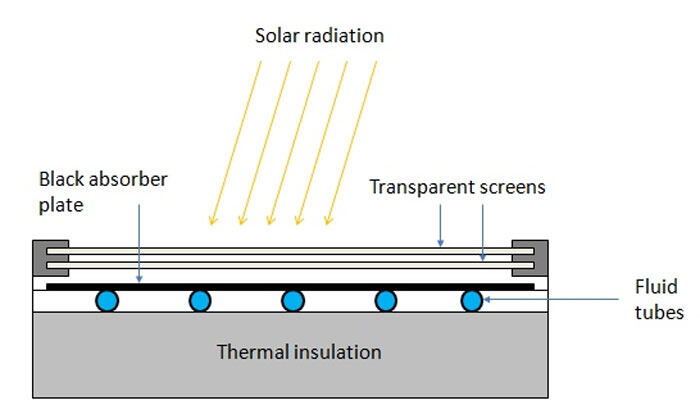Contents:
As South Africa continues to grapple with rising electricity costs and unreliable power supply, solar energy is rapidly becoming a practical and sustainable alternative. One specific and increasingly popular application of this green technology is swimming pool solar heating. With the country's abundance of sunlight and growing interest in eco-friendly solutions, solar pool panels are transforming how South Africans enjoy their pools year-round.

Why Solar Pool Heating Makes Sense in South Africa
South Africa experiences more than 2,500 hours of sunlight annually, making it one of the sunniest countries in the world. This natural advantage makes solar heating for pools not just feasible, but highly effective. Here are several reasons why investing in solar pool panels is a smart decision:
1. Cost-Effective
While the upfront investment may be substantial, the long-term operational costs are minimal. Unlike electric or gas pool heaters that consume costly energy, solar systems run on free sunlight. This means significant savings on electricity bills over time.
2. Extends the Swimming Season
Without heating, many pools are only usable for 3–4 months each year. With solar heating, water temperatures can be maintained at comfortable levels from early spring to late autumn, effectively doubling the usable swimming season.
3. Eco-Friendly
Solar pool heating produces zero carbon emissions, helping households reduce their environmental footprint. In a country seeking solutions to both energy and climate challenges, this is a win-win.
4. Low Maintenance and Long Lifespan
Solar pool heating systems typically last 15–20 years, with minimal maintenance. Once installed, there are very few recurring costs, making it a low-hassle investment.

How Solar Pool Heating Works
The basic principle of a solar pool heater is simple:
-
Water is drawn from the pool by the existing pump and passed through a filter.
-
The filtered water then flows through solar collectors, typically mounted on a roof or rack where sunlight is abundant.
-
The collectors heat the water using solar radiation, and the warm water returns to the pool.
-
A controller may be used to regulate temperature, directing water to the collectors only when beneficial.
This process can raise pool temperatures by 5°C to 10°C, depending on the system size and local climate.
Types of Solar Pool Panels
Several types of solar collectors are available in South Africa, each suited to different climates, budgets, and use cases:

Unglazed Collectors
Made from UV-resistant rubber or plastic, these are the most common and affordable type. Ideal for seasonal use in warmer regions like KwaZulu-Natal.

Glazed Collectors
These include a glass cover and are made from copper or aluminum. More efficient and suitable for cooler areas like Gauteng and the Western Cape, especially if year-round heating is required.
.jpg)
Hybrid Panels (Photovoltaic-Thermal or PVT)
Combining electricity generation with thermal heating, these systems are cutting-edge but more expensive. They are ideal for tech-savvy homeowners wanting an integrated energy solution.
Installation and Key Considerations
Before purchasing and installing a solar pool heating system in South Africa, several factors must be evaluated:
Location and Climate
Coastal regions benefit from milder winters, allowing longer periods of efficient solar heating. Inland areas might require backup heating during the coldest months.
Roof Orientation
In the southern hemisphere, north-facing roofs provide the best exposure to sunlight. Flat or gently sloped roofs also work well.
System Sizing
A general rule of thumb is that the solar collector area should be 50% to 100% of the pool’s surface area. A professional assessment can determine the optimal configuration.
Pump Compatibility
The existing pool pump may be sufficient for circulating water through the collectors. However, if not, an upgraded pump may be necessary.
Visualizing Solar Performance: A Seasonal Water Temperature Trend
To better understand the impact of solar heating throughout the year, below is a chart simulating average pool water temperatures in a typical South African home using solar panels.
This example helps visualize how solar panels can boost pool usability during shoulder seasons like March–May and September–November.
Top Solar Pool Panel Suppliers in South Africa
Choosing a reputable installer ensures proper setup and long-term satisfaction. Below is a comparative table of popular solar pool heating providers:
| Supplier |
Coverage Area |
Panel Type |
Warranty |
| SunScan Solar |
Nationwide |
Unglazed Rubber |
10 Years |
| SolarBeam |
Western Cape, Gauteng |
Glazed Copper |
15 Years |
| EcoSolar |
Coastal Regions |
Unglazed Polymer |
8 Years |
| ITS Solar |
All Provinces |
Hybrid PVT |
12 Years |
Conclusion
Swimming pool solar panels in South Africa are a smart, environmentally friendly, and economically sound investment. The country’s climate makes it one of the best regions globally for solar energy applications. With the right system, you can extend your swimming season, reduce your electricity bills, and enjoy greater comfort without relying on Eskom or fossil fuels.
Whether you're a homeowner looking to enhance your lifestyle or a commercial property manager aiming to cut energy costs, solar pool heating is a worthwhile consideration. With low maintenance, long lifespans, and proven performance, it’s a decision that pays dividends for years to come.
FAQs
How much does it cost to install solar panels for a swimming pool in South Africa?
The cost typically ranges from R20,000 to R50,000, depending on the size of the pool, the type of solar collectors used (unglazed vs. glazed), and the complexity of the installation. While this is a significant upfront investment, it usually pays for itself in 2–4 years through energy savings.
Can solar pool heating systems still work during cloudy or rainy days?
Yes, but with reduced efficiency. Solar pool panels will still absorb diffuse sunlight on cloudy days, but the water may not reach the same temperatures as on sunny days. In areas with frequent overcast conditions, some users install a backup heater (like electric or gas) for consistent warmth.
Is a north-facing roof required for solar pool panels in South Africa?
A north-facing roof is ideal in the Southern Hemisphere for maximum sun exposure. However, east or west-facing roofs can also work with slightly lower efficiency. In some cases, ground-mounted racks or angled frames are used when roof space is limited or poorly oriented.
How long do solar pool panels last, and what maintenance do they require?
Most quality solar pool panels last between 15 to 20 years. Maintenance is minimal: occasional cleaning to remove dirt or leaves, checking for leaks in plumbing lines, and ensuring the pool pump/filter is functioning well. Annual inspections are recommended for optimal performance.
Can I integrate solar pool heating with my home's solar power system?
Yes, but they are typically separate systems. Pool solar heating uses thermal collectors, whereas household systems use photovoltaic (PV) panels. However, advanced systems like PVT (Photovoltaic-Thermal) panels combine both. These are more expensive but offer higher efficiency and dual-function capability.










.jpg)